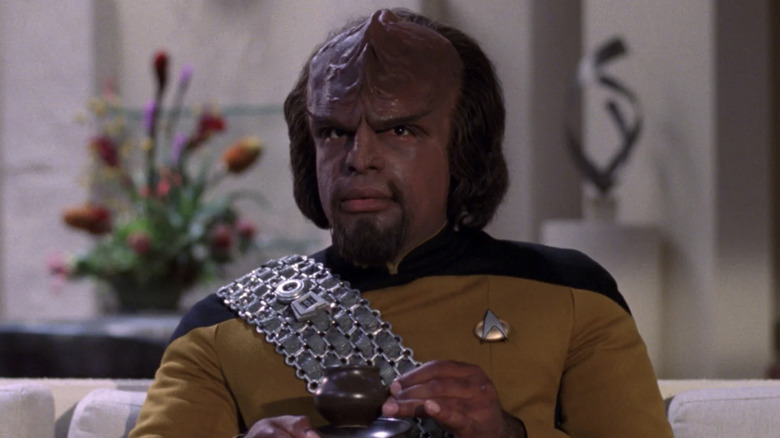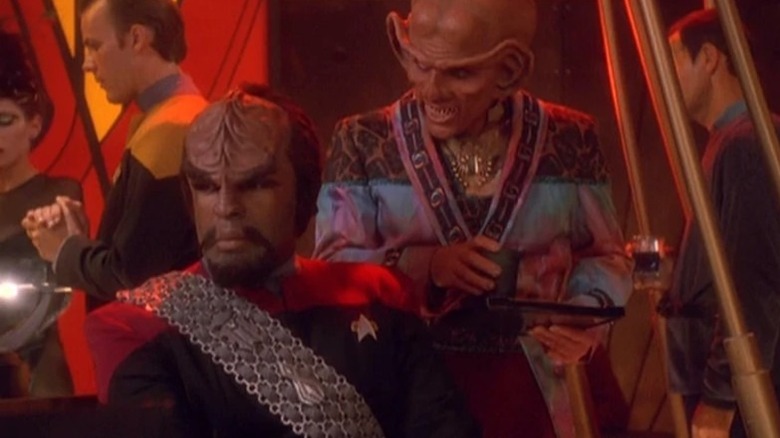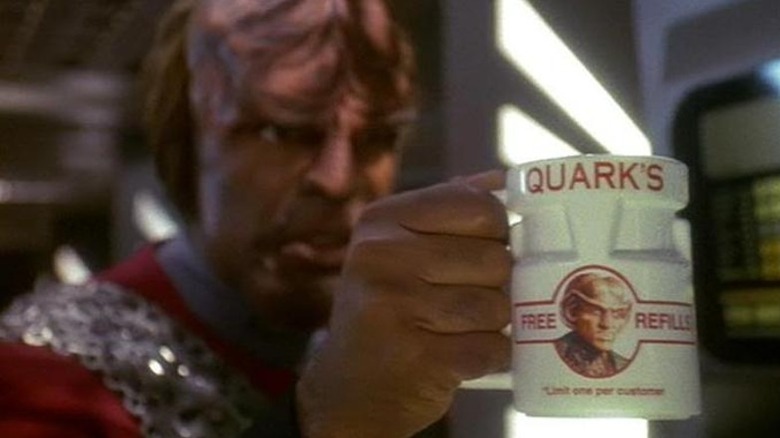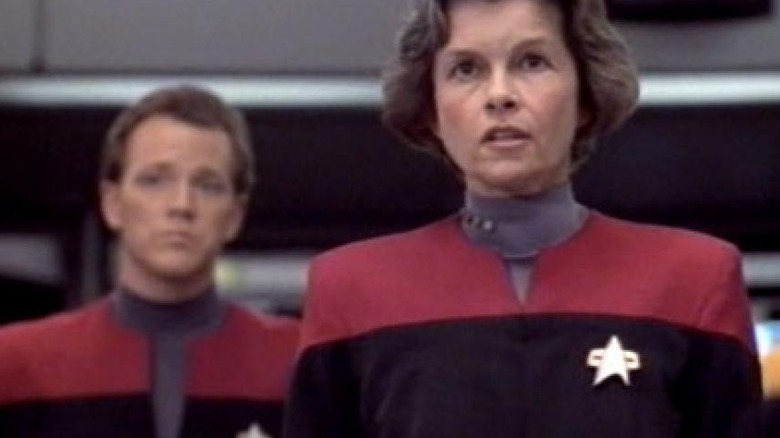Remembering Worf's Lines Could Apparently Be A Struggle For Star Trek's Michael Dorn
Between seven seasons of "Star Trek: The Next Generation" and four seasons of "Star Trek: Deep Space Nine" — not to mention five feature films, and an upcoming season of "Star Trek: Picard" — actor Michael Dorn has appeared onscreen in more "Trek"-related projects than any other actor. To date, he has made 282 TV appearances, all as the character Worf (with a footnote devoted to the Klingon defense attorney he played in "Star Trek VI: The Undiscovered Country"). The only person who has his record beaten is Majel Barrett who, thanks to her roles as Number One, Nurse Chapel, Lwaxana Troi, and the voice of Starfleet computers, appeared in 302 episodes, all told.
Anecdotally, when Dorn moved onto Deep Space Nine in the episode "The Way of the Warrior" (October 2, 1995), some fans bristled. "The Next Generation" had only gone off the year the year before, and "Star Trek: Voyager" has already premiered as the new hotshot kid on the block. Fans of "Deep Space Nine" were mildly miffed that the show never had much of a chance to carry the franchise on its own. To offer a brief timeline, NextGen ended in May of 1994 and its first movie, "Star Trek: Generations" came out on November 18. "Voyager" premiered in January of '95. "Deep Space Nine" was left all alone for a grand total of four episodes ("Defiant," "Fascination," and "Past Tense" parts I and II). A mere 15 episodes later, Worf — a NextGen character — would join the show, cementing the idea that DS9 was always going to need another show to lean on.
But Armin Shimerman — who played series regular Quark on DS9 — sees it differently.
Worf is phenomenal, but...
In a recent appearance at Fanboy Expo in Knoxville, Tennessee (via TrekMovie), Shimerman said that and Dorn became very close friends over their four seasons working together, and admired that the writers on the show were able to do so much with Worf. Shimerman also, with apologies to Dorn, said that his co-star struggled a lot with memorizing dialogue. When asked how close he was with the cast, Shimerman was warm, but frank:
"All of them are friends, but Michael is one of my closest friends. I see Michael on a regular basis. What Michael has done with Worf is truly phenomenal. And it's a great credit to him and to others that wrote Worf for what they've done. I love Michael, however, Michael, God bless him, has a problem memorizing lines."
Memorizing lines is, of course, an absolute requirement when it comes to working on television. Most long-running TV shows like "Star Trek" work at a brisk pace, needing to make 26 episodes in a season (oh, how spoiled we were in the '90s!). When it came to timing out make-up jobs and lighting, making special effects, and even turning in scripts on a schedule, everything had been honed to a science. As such, when an actor appeared on set in full costume and make-up, they needed to bang out a scene as efficiently as possible. Know the lines, understand the scene, get a few takes and move on.
Shimerman admits that Dorn, for however good his acting, often required more than the three takes that were somewhat standard for most scenes on DS9.
Trekking at warp speed
Shimerman goes into some detail as to what a workday looked like on "Deep Space Nine." He doesn't mention that he and Dorn likely had to arrive on set earlier than their co-stars, as they required far more elaborate alien make-up (Shimerman played a Ferengi, Dorn a Klingon). But once they were on set, Shimerman points out that it was all a very technical process. It was all about illuminating the scene, recording sound, moving the camera. Character work is important, but that had to be achieved during that brief spans when the cameras were rolling:
"[U]sually, you'll do little setups of different camera angles, whether it's a three-shot or two-shot or close-up. Those all take a different setup, different lighting, everything has to be done differently for each of those framing jobs. So usually, you do it first time. And then if they don't like it, they ask you to do a second time. And then when they say just to be to cover themselves for insurance, they may do it a third time and then they move on. But that means that you have to get the lines right. Michael didn't always get the lines right.
The following statement sounds a little bit like Shimerman might be exaggerating, but his meaning is clear: Shimerman had long since wanted to move on by the time Dorn nailed a scene. "Sometimes," Shimerman said, "by the time we got to the 25th take, Michael had the lines right but I was done with that scene."
When Geneviève Bujold quit
Tangentially related, but also substantiating Shimerman's story of breakneck pacing when it came to making "Star Trek," is the well-known story of Geneviève Bujold's brief stint as Captain Janeway on "Star Trek: Voyager." Bujold, a classically trained actress, was considered quite a "get" to play a captain on a Trek program, and the showrunners on "Voyager" were, as Trekkies recall, happy to have her. This was back when the character was named Nicole Janeway.
Infamously, the shooting schedule was far too brutal for Bujold. Scenes needed to move quickly, and Bujold was far more accustomed to shoots that allowed for more breathing room. According to a 1995 TV guide interview with "Trek" executive producer Rick Berman, Bujold was far more interested in workshopping scenes and discussing character than she was in nailing lines and moving forward. The few scenes Bujold shot can be seen on YouTube, and it's clear she was bringing a much, much different energy to the room than her co-stars. Bujold left after a day and a half of shooting and was replaced by Kate Mulgrew.
"Star Trek" doesn't just require an ability to delve into character while wrapping your head around weird sci-fi concepts and mini morality plays. Practically, you just have to charge headlong through scenes and get them on film before the next scene starts. Dorn, it seems, barely gutted it out.
Dorn will return for the third season of "Star Trek: Picard," coming in 2023.



